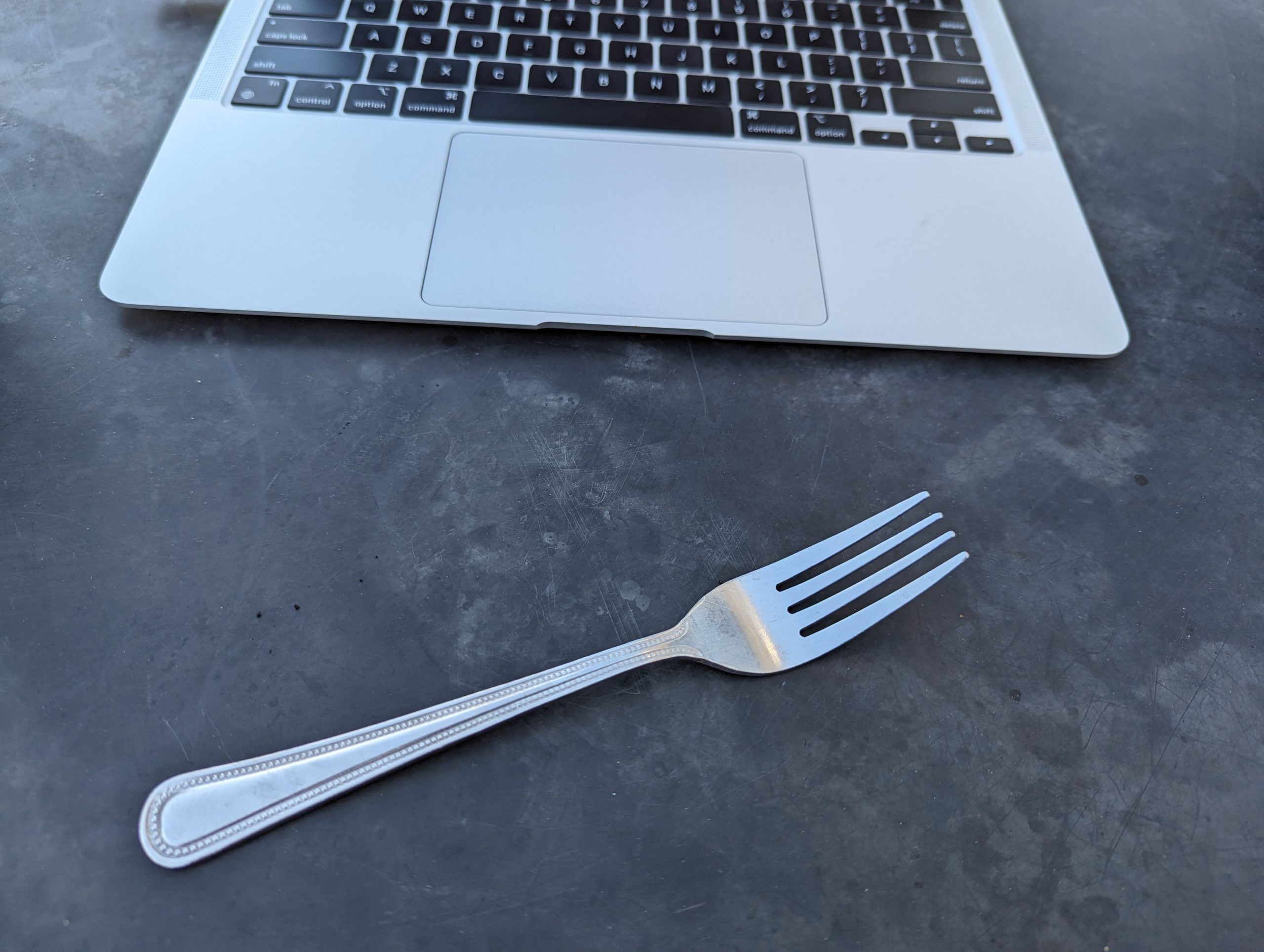
No doubt you have heard the expression, “Running out of spoons.” It’s for days when your energy and innate natural life force are depleted, when you struggle to get through the motions of daily life. I remember days like that when I was living with chronic anemia and menorrhagia from fibroids. If I could manage to log six hours of work time, order Pho for a late lunch, and get the aforesaid spoon into the dishwasher, it was a good day!
I’d like to add a new term to the lexicon:
“Running out of forks.”
This is for times when you have tasks in front of you that are a bit more challenging. And yeah, there is a Git reference there as well. I would be so honored if anyone ever chose to fork my projects. It hasn’t happened yet. Ever try eating spaghetti with a spoon? Sometimes, you do need prongs.
The particular reason that I’m low on forks is RSI — also known as Repetitive Strain Injury. It’s a common injury for designers, and also afflicts programmers (or virtually anyone else who puts in long hours with a mouse and keyboard) from time to time. Pain is easy to ignore. Until the point when you just can’t ignore it. Imagine the sensation of a white-hot metal wire pressed into the palm of your hand. It only got that bad a few times, but that’s why I learned to eat and do simple tasks with my left hand as well as my right.
My employer in 2022 tried hard to accommodate my injury. In fact, it went away completely for several months! I was not prepared for the extent to which the hand and arm pain came back after surgery for the fibroids (a completely separate issue). My doctor at the time warned me that fully healing from the surgery would require at least a full year. I’ve not seen medical literature to support this, but it makes perfect sense that while my body was recovering from a major surgical procedure, I would be more susceptible to re-injury. Repairing tissue takes nutrients and energy.
I received a small cash settlement for the RSI injury (equivalent to about three months of pay), which helped. The majority of my time this year has gone into planning and research around a social venture to support adults living with chronic and serious illness. The way in which my life changed completely took me by surprise. We are a mostly invisible group, but there are a lot of us. If you live alone, you are even more vulnerable. Particularly in the post-COVID era.
Regardless, I’m not here to complain or feel sorry for myself. I know exactly why the injury got bad. I was working long hours and not taking breaks, trying to reach a milestone on an old Python project. Which I met. Now it’s up to me to rest until the pain subsides, and keep fine-tuning my ergonomic setup and exercise routine until I am able to put in something close to a normal working day. I’ll be moving back to Oregon in May. Until then, my expenses are pretty low.
Have the budget to walk into town about every other day and grab myself a slice of pizza, a cup of coffee, or a beer. Not more than that. Or I lose my runway.
I’m grateful to have this time. Just frustrated I don’t have more forks! So many interesting and challenging tasks await. Opportunities to learn… opportunities to build… dream jobs that I am missing out on applying for…
On the plus side, I can still take walks and read books to my heart’s content. I have my energy back, which is a welcome change from life with severe fibroids, two years ago.
Most tasks are fine in moderation. I just have to be extremely aware of when I’m getting to the “red zone” and force myself to stop. I’m learning to be more strategic about where I put my time and resources. I can still do management, customer support, and coaching work until the cows come home! Too bad those first two categories are shedding so many jobs. Keyboard is ok up to a point. Anything that involves a lot of repetitive mouse work (which can include IDE’s) is a a greater concern. If I never open up another Figma file in my life, I’d be ok with that. Design comes naturally and easily to me and I love the interdisciplinary nature of UX work. By contrast, AI very much requires the command line and it’s where the innovation is happening right now in our industry.
I think in the long run, it will work out. I just wish voice recognition software were a teensy bit better. What was missing (last time I checked) was something equivalent to a sudo or vi mode where it was possible to switch from dictation to navigating with the cursor to fix mistakes. If all else fails, that may be an area where I could make some contributions.
Figured out some hypothetical voice dictation training exercises which would not bore me to tears. The last time I made a chess reference on this blog was almost seven years ago. I’m in a very different place today, but not necessarily a worse one. (Cannot overemphasize the importance of actually getting that busted uterus removed!) Maybe dictating chess moves would be a good place to start for teaching the computer some new conventions for voice recognition.
And other people would benefit too.
So yeah, the same basic principle espoused in that post continues to hold true. I’ll figure things out.

